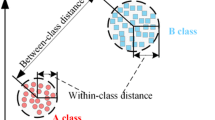Abstract
A method of kernel principal component analysis (KPCA) based on particle swarm optimization (PSO) is presented, which is applied in fault condition recognition of gear box. Comprehensively considered within-class scatter and between-class scatter of samples feature, the fitness function of kernel function parameter optimized is constructed, and the particle swarm optimization algorithm with adaptive accelerate (CPSO) is applied to optimize it. This method is applied to gear box condition recognition, compared with the recognized results based on principal component analysis (PCA). The results show that KPCA optimized by CPSO can effectively recognize fault conditions of gear box by reducing bind set-up of kernel function parameter, and its results of fault recognition outperform those of PCA. The conclusion is that KPCA based on PSO has advantage in nonlinear feature extraction of mechanical failure, and is helpful for fault conditional recognition of the complicated machine.
Preview
Unable to display preview. Download preview PDF.
Similar content being viewed by others
References
Schoelkopf, B., Smola, A., Mueller, K.R.: Kernel Principal Component Analysis. In: Advances in Kernel Methods-Supper Vector Learning, pp. 327–352. MIT Press, Cambridge (1999)
Jongmin, L., Changkyoo, Y., et al.: Nonlinear Process Monitoring Using Principal Component Analysis. Chemical Engineering Science 59, 223–234 (2004)
Guanglan, L., Tielin, S., et al.: Gearbox Condition Monitoring Based on Kernel PCA. Mechanical strength 27, 1–5 (2005)
Qingbo, H., Fanrong, K., Ruanqiang, Y.: Subspaced-based Gearbox Monitoring by Kernel Principal Component Analysis. Mechanical Systems and Signal Processing 21, 1755–1772 (2007)
Ratnaweera, A., Halgamuge, S.K., Watson, H.C.: Self-organizing Hierarchical Particle Swarm Optimizer with Time-varying Acceleration Coefficients. IEEE Transactions on Evolutionary Computation 8, 240–255 (2004)
Hongxia, P., Qingfeng, M.: Research on Gearbox Fault Diagnosis Method Based on Adjusting-learning-rate PSO Neural Network. Journal of Donghua University (Eng. Ed.) 23(6), 29–32 (2006)
Schoelkopf, B., Smola, A., Mueller, K.R.: Nonlinear principal component analysis as a kernel eigenvalue problem. Neural Computation 10, 1299–1319 (1998)
Xuewen, H.: Research on the Theory and Method of Intelligent Fault Diagnosis Based on Support Vector Machine. South university of China, Changsha (2004)
Ruixiang, S., Fugee, T., Liangsheng, Q.: Evolving Kernel Principal Component Analysis for Fault Diagnosis. Computer and Industrial Engineer 53, 361–371 (2007)
Xinfeng, W., Jing, Q., Guanjun, L.: Kernel Function Optimization in Kernel Principle Component Analysis and Its Application to Feature Extraction of Gear Faults. Journal of Vibration, Measurement & Diagnosis 27(1), 62–64 (2007)
Author information
Authors and Affiliations
Editor information
Editors and Affiliations
Rights and permissions
Copyright information
© 2009 Springer-Verlag Berlin Heidelberg
About this paper
Cite this paper
Pan, H., Wei, X., Xu, X. (2009). Fault Condition Recognition Based on PSO and KPCA. In: Leung, C.S., Lee, M., Chan, J.H. (eds) Neural Information Processing. ICONIP 2009. Lecture Notes in Computer Science, vol 5864. Springer, Berlin, Heidelberg. https://doi.org/10.1007/978-3-642-10684-2_69
Download citation
DOI: https://doi.org/10.1007/978-3-642-10684-2_69
Publisher Name: Springer, Berlin, Heidelberg
Print ISBN: 978-3-642-10682-8
Online ISBN: 978-3-642-10684-2
eBook Packages: Computer ScienceComputer Science (R0)



